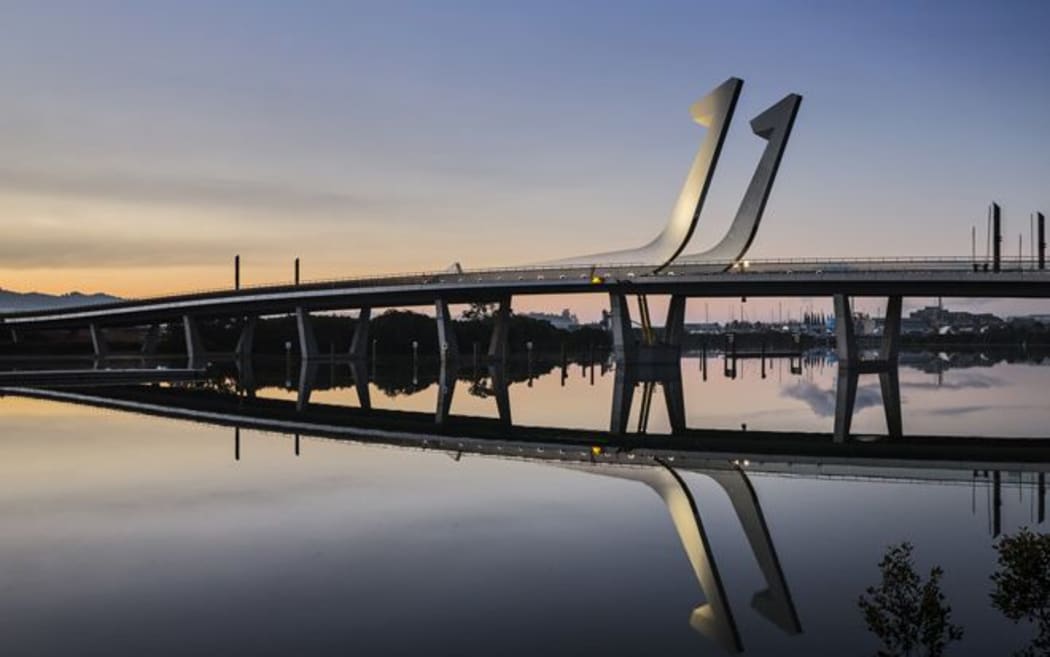Whangarei homeowners could see their rates rise by 9 percent this year and there may be more hefty increases to follow.

The city's award-winning new harbour bridge, Te Matau a Pohe, costs the council $500,000 a year in maintenance and operating costs Photo: SUPPLIED
The Whangarei District Council says its expenses now exceed its annual income by $5 million a year, and it is facing some tough choices.
It flags the likelihood of significant rate rises in a pamphlet sent out this week to ratepayers, which warns of a coming "step change" in rates in the new financial year.
The council's finance chief, Allan Adcock said to balance its budget, and cover the costs of projects set out in the proposed Long Term Plan, the council would need to put rates up by 9 percent this year, and 5 percent each subsequent year until 2025.
Mr Adcock said since 2006, the Whangarei council had pegged rate rises to the level of inflation, but realistically, that could not continue.
"If we compare councils which offer the same range of services we do, we're actually the lowest in the country. And we're actually the second-lowest over all."
The average residential rates bill was $1426 a year compared to the national average of just over $2000.
"It's true we have lots of people on low incomes here, and it's probably appropriate that our rates are somewhat below average. But so far below the average - that is not sustainable."
Council borrowed to fund major projects
Whangarei mayor Sheryl Mai said the council had borrowed in recent years to fund major projects including a new bridges, a library, sports fields, an aquatic centre, and new cycle and walkways.
It had also upgraded infrastructure, building new roads, and by popular demand, new sewerage works, to clean up the harbour.
Ms Mai said people now enjoyed the benefits of those facilities, but the council debt sits, capped, at $160 million and the council did not want to borrow more.
"One option of course [to cover the operating deficit] is to increase our debt. But that's a credit card mentality. You buy your groceries with the credit card, which is unsustainable."
Ms Mai said as a consequence of building new infrastructure, the council's maintenance bill had increased.
The city's award-winning new harbour bridge, Te Matau a Pohe, costs the council $500,000 a year in maintenance and operating costs. Toll Stadium, built with ratepayers' money in time for the World Cup, is still a charge on the council, which agreed to underwrite its initial losses.
Mr Adcock said the stadium was gradually becoming self-supporting, but this year cost Whangarei ratepayers about $145,000.
Sheryl Mai said if Whangarei people wanted the council to maintain existing services, and go on putting money aside for future civic projects like a full-size theatre, the revenue must be increased through rates.
The council will also have to fund some more big-ticket items, such as replacing Whangarei's ancient stormwater system.
"You don't see the wrinkles in an old stormwater pipe - until you dig it up. And then you discover it really should have been replaced some years ago. Some of the pipes are a hundred years old so they really are at the end of their life. We need to invest so we've got it right for the next generations."
Options for ratepayers
The Whangarei mayor said the choices open to Whangarei people were to keep the rates low and lose services, with the immediate targets being shorter opening hours at libraries and transfer stations; letting the grass grow longer in city parks and reducing the nice-to-have extras, like festive decorations and flags.
She said people might opt for a more modest rates rise than 9 percent, with fewer service cuts, or to keep the status quo and accept rates that were more in line with those paid in other comparable regional centres.
If the council goes with a 9 percent increase the average residential rates bill in Whangarei will go up by about $100.
The council urges ratepayers to read the consultation document on its Long Term Plan and let it know what they think of the options - in submissions and at public meetings in the coming weeks.

